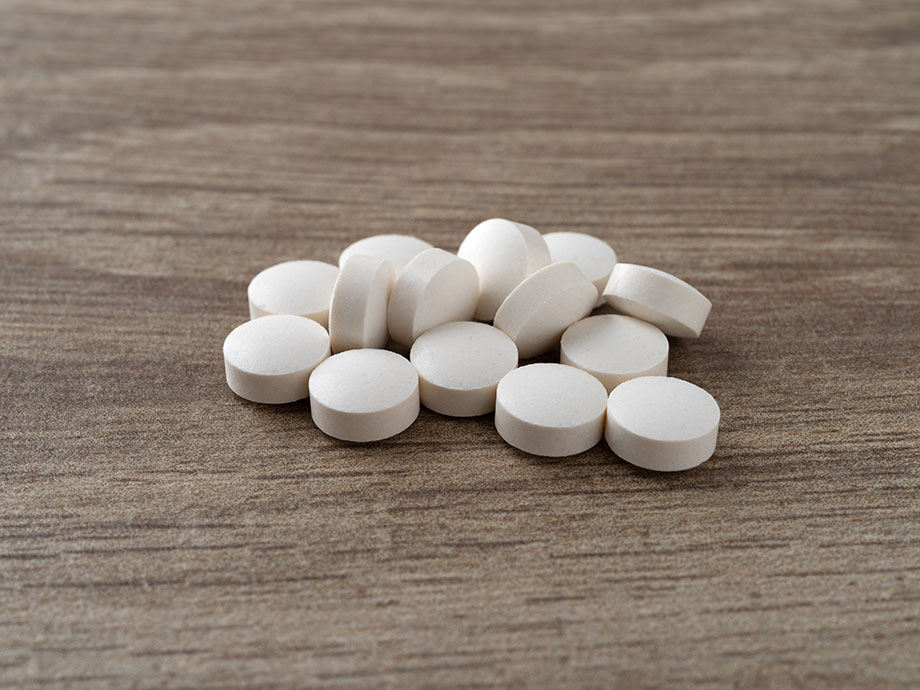We test and review fitness products based on an independent, multi-point methodology. If you use our links to purchase something, we may earn a commission. Read our disclosures.
Perhaps you’ve come across DHEA listed on the label of muscle-building supplements or testosterone boosters and wondered what exactly it is and how it relates to muscle health and testosterone levels. Maybe you’ve heard DHEA is an anti-aging powerhouse and should be part of your wellness routine.
In short, DHEA is a natural hormone found in your body. It’s also available in synthetic form as a stand-alone dietary supplement or as an addition to the above-mentioned sports nutrition supplements. The claimed DHEA benefits of supplementation include supporting optimal hormone levels, improved body composition, and anti-aging support.
If you’re an athlete, you’re probably familiar with DHEA as an ingredient to avoid, but more on that in a minute. In this article, I—a registered dietitian—will explore the potential benefits, risks, and side effects of DHEA supplements.
If you are a transmasculine or transfeminine athlete, DHEA supplements are not designed with your specific needs in mind. Please consult a trans-affirming medical professional for your hormone replacement therapy needs. HRT is a therapeutic treatment that you might need whether you’re trans or cisgender. It’s overseen by a doctor and endocrinologist, and that is the safest way to alter your gender-related hormone levels.
Medical disclaimer: This article is intended for educational and informational purposes only. It is not intended as a substitute for medical advice. For health advice, contact a licensed healthcare provider.
What Is DHEA?
DHEA is short for dehydroepiandrosterone, which is a mouthful, so I’ll stick to calling it DHEA from here on out. DHEA is a hormone present in both men and women and naturally produced in the adrenal glands, which are located on top of your kidneys.
You might be wondering why DHEA doesn’t sound as familiar as other hormones, like cortisol, insulin, or adrenaline. The reason may be that DHEA is primarily a precursor hormone, which means its job is to help your body synthesize other hormones. DHEA is sometimes called a steroid hormone because it can increase the production of some steroid hormones in the body.
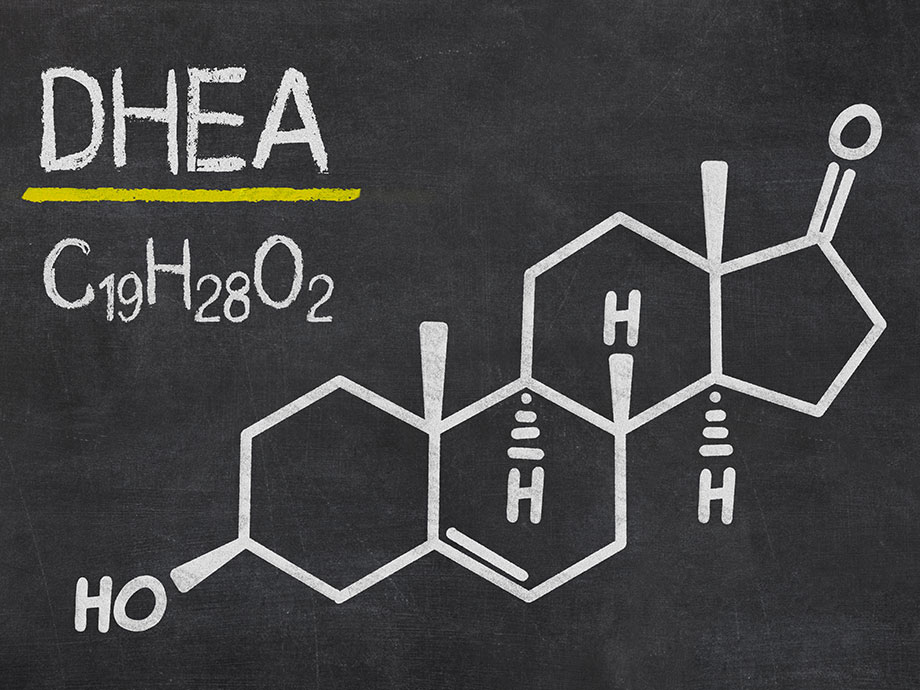
Your body uses some DHEA to produce both male and female sex hormones, including estrogen, progesterone, and testosterone. DHEA may not get as much attention as other hormones, but it is a part of your endocrine system and helps support balanced hormones.
Natural DHEA vs DHEA Supplements
Like many other bodily processes, your body’s natural DHEA production gradually declines as you age. It’s estimated that natural production of DHEA begins to decline around age 30. It’s unlikely individuals in their 20s need to supplement DHEA since natural levels should still be at their peak.
The domino effect tells us that reduced DHEA levels may lead to decreases in sex hormones, which, in turn, can impact how you feel and function. Some people even believe low DHEA is a contributing factor to the development of chronic health problems or a weakened immune system.
Taking DHEA can counteract this natural slowdown and result in increased levels of DHEA and sex hormones in the body. Researchers have found that DHEA supplements do, in fact, lead to increased circulating levels of DHEA, testosterone, and estrogen1 in the body.
So, should you be supplementing with DHEA? Let’s dive into potential benefits and risks of DHEA supplements.
DHEA Benefits
The function of natural DHEA in the body is well understood, but there’s limited evidence to support the use of DHEA supplements. Most of the research on the benefits of DHEA has been done in older adults and individuals with chronic conditions.
Some DHEA benefits you may hear about include improved body composition, fewer signs of aging, enhanced cognitive function, and as a treatment for various health conditions, including sexual dysfunction.
RELATED: The Ultimate Body Recomposition Guide
Since you’re visiting Garage Gym Reviews, we’re assuming you want to know if DHEA can help you build muscle and/or lean out. We’ll touch on the DHEA benefits for general health and focus on its potential for sports and fitness.
Body Composition
In the sports and exercise world, DHEA is considered an anabolic agent. If DHEA can help your body produce more testosterone, it’s a reason to think it can also help you build muscle and increase muscle strength. The more testosterone you have, the easier it is to synthesize proteins and increase muscle mass. This is generally true for most people regardless of their sex assigned at birth. That said, transmasculine athletes interested in hormone replacement therapy (HRT) are encouraged to reach out to a trans-affirming endocrinologist rather than relying on supplements.
Unfortunately, the bulk of research on DHEA for muscle growth isn’t current and provides inconclusive results at best. Most of the studies examining this DHEA benefit have been conducted on lab animals or older males, although a few have tested DHEA on younger people and cis women.
A 2020 meta-analysis2 concluded that taking DHEA results in more muscle and less fat. However, the authors don’t break down results by age or gender, and previous studies found DHEA ineffective for improving body composition. More studies are needed to understand if DHEA can counteract age-related muscle loss, which is called sarcopenia.
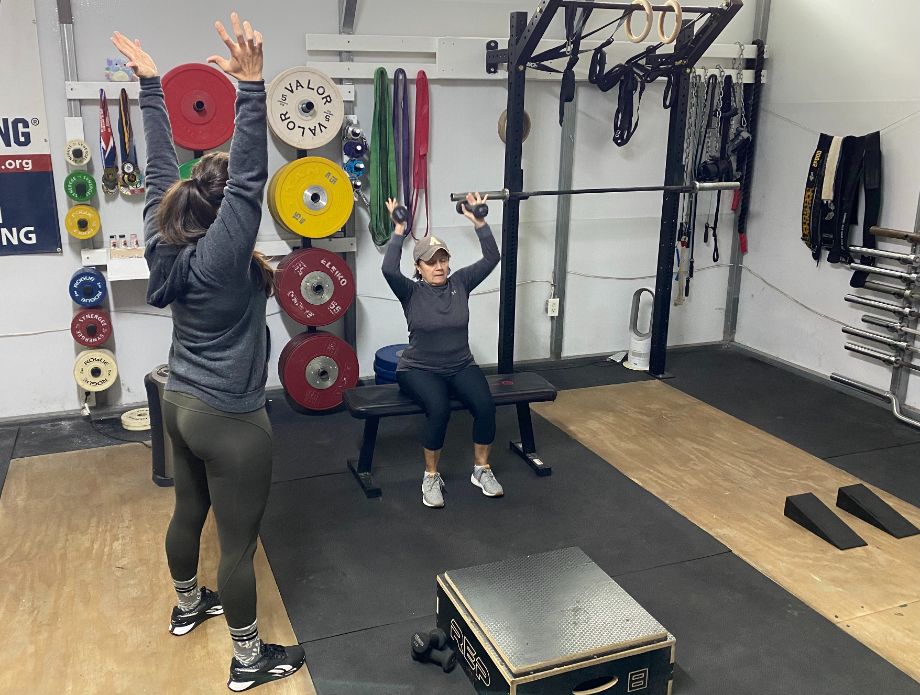
For example, small studies found DHEA supplementation resulted in no change in muscle size or strength in menopausal cis women3 or young (aged 19 to 22 years) cis male athletes4.
DHEA has also been studied for fat loss with mixed results. A 2011 study5 found that one year of taking DHEA didn’t lead to any change in fat mass in older men and women. On the other hand, a 2013 meta-analysis6 concluded supplemental DHEA can help older males shed excess body fat.
The bottom line? DHEA may help some people increase lean mass and decrease fat mass to a small degree. However, it’s not as effective as other well-studied sports nutrition supplements, like whey protein powder and creatine.
Anti-Aging
Here’s the link between DHEA levels and signs of aging in the skin:
Collagen, which is the major structural protein found in skin, is responsible for plump, smooth, well-hydrated skin. Collagen production slows with age, and a loss of collagen contributes to wrinkles, thinning, and sagging skin.
RELATED: Benefits of Collagen Protein Powder
As estrogen levels decrease with age, signs of aging skin appear faster. Higher estrogen levels7 help stimulate collagen production, which is why DHEA is sometimes used to support estrogen and counteract aging.
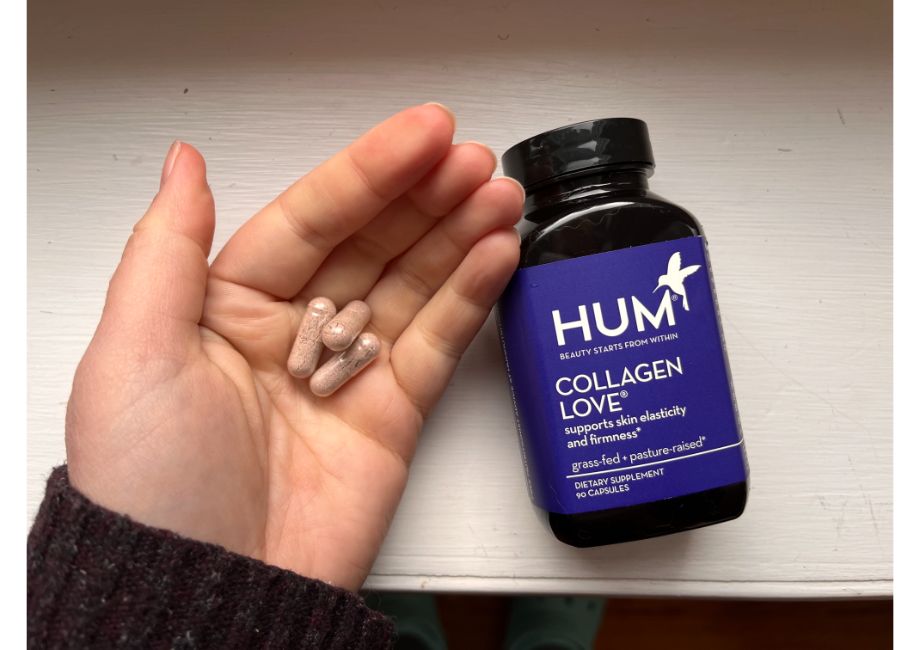
There aren’t many studies on oral DHEA supplementation and signs of aging. In contrast, collagen supplements are well-studied and proven beneficial for improving skin health and combating premature skin aging.
Other DHEA Benefits
- Depression and mood: Low DHEA levels have been associated with depression. Of course, association doesn’t equate to causation. The evidence supporting DHEA for depression is mixed. A 2018 meta-analysis8 concluded DHEA can improve symptoms of mild depression and may be a useful alternative to antidepressants. However, a more recent 2023 review9 found DHEA didn’t improve depression or mood in older women.
- Bone health: Low DHEA levels are also associated with decreased bone density, which is a measure of how strong your bones are. Low bone density is a risk factor for osteoporosis and bone fractures. Women are at higher risk for developing osteoporosis than men due to the drop in estrogen they experience after menopause. It has been proposed that taking DHEA can raise estrogen levels and support bone health. Studies show DHEA can improve bone density in cis women10, but not cis men.
- Women’s health: Because estrogen levels are closely tied to women’s well-being and sexual health, DHEA has been considered an intervention to lessen menopausal symptoms, improve sexual function, and support fertility. This probably isn’t a big surprise, but the evidence supporting DHEA for women’s health11 is lacking and inconclusive. However, vaginal DHEA has been found effective for treating vaginal dryness and atrophy in older women.
DHEA Side Effects
Unfortunately, DHEA is associated with quite a few side effects. The good news is these side effects are likely dose-dependent.
Mild adverse effects have been documented in studies administering DHEA in doses of 25 to 50 milligrams (mg) per day over several months up to one year. The most common reported side effects12 are acne, oily skin, and stomach upset. If you’re using DHEA to support anti-aging, breakouts, and greasy skin are pretty ironic, aren’t they?
Higher dosages and long-term use of DHEA are associated with an increased risk of side effects. Both men and women can experience abnormal sex hormone changes11 from elevated androgens and estrogens. These can include breast growth in cis males and abnormal hair growth, called hirsutism, in cis women.
There’s also evidence that DHEA supplements can worsen mood disorders and reduce HDL cholesterol (high-density lipoprotein), which is the “good” kind that helps protect against heart disease.
RELATED: What is LDL Cholesterol?
Since DHEA can increase the production of estrogen and testosterone, it’s not recommended for anyone with a hormone disorder, including thyroid conditions, diabetes, polycystic ovarian syndrome, and infertility. DHEA is also contraindicated for individuals who have a family history of hormone-related cancers, such as breast or prostate cancer.
DHEA can also interact with several medications. We always recommend running any new supplements you’d like to try by a trusted healthcare provider. Because DHEA influences levels of other hormones, this isn’t a supplement you want to start without input from your doctor.
DHEA and Athletes
Let’s not beat around the bush: DHEA for athletes is a big no-no. DHEA has been classified as an anabolic agent and steroid and banned by the World Anti-Doping Agency. Professional sports organizations, including the National Collegiate Athletic Association (NCAA) and the NFL, have DHEA listed as a banned substance.
If you’re an athlete who undergoes routine drug screening, you definitely don’t want to get mixed up with DHEA. Choosing products that are third-party tested and certified for sport is an easy way to verify the safety and purity of any supplement you use. Look for NSF-Certified for Sport or Informed-Choice Sport on supplement labels—both indicate a product is free from banned substances.
How To Take DHEA
If you’ve decided the potential DHEA benefits outweigh the possible side effects, here’s what you need to know about selecting a supplement. DHEA supplements are available over the counter from supplement stores and online retailers, including Amazon.
The majority of DHEA supplements are available in pill or capsule form, but you can also find DHEA quick-dissolve tablets and liquid drops. There’s no evidence that one form is superior to another, so choose the best one that fits your preferences.
DHEA supplements aren’t regulated by the FDA, so I recommend choosing one from a reputable brand, ideally one that uses third-party testing, to ensure you’re getting a quality product.
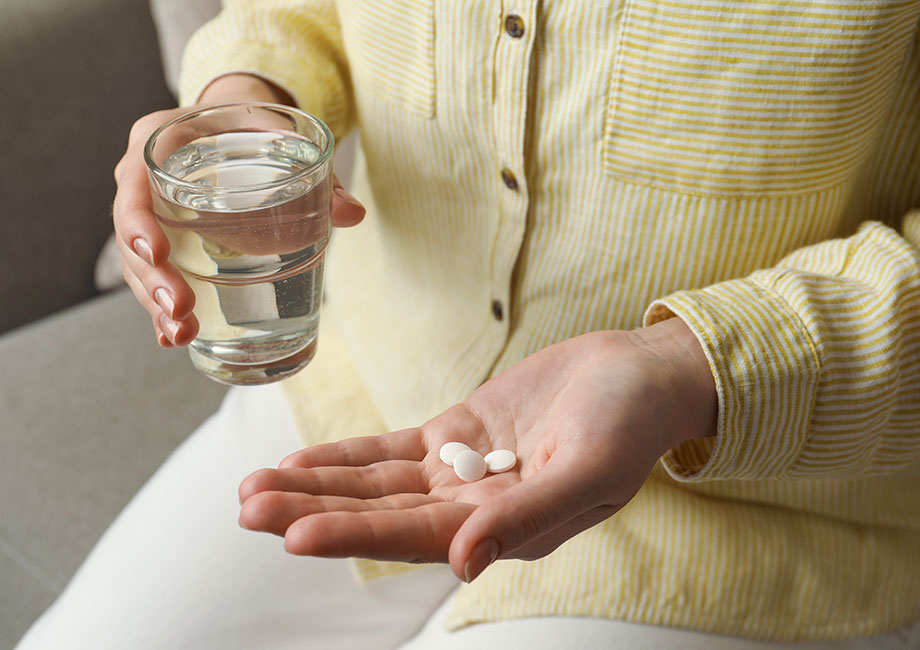
Common dosages include 10 milligrams, 25 milligrams, 50 milligrams, and 100 milligrams. It’s best to start with a low dosage so you’re not getting more DHEA than you need and increasing your risk for possible side effects. Most studies have used a dosage of either 25 milligrams or 50 milligrams of oral DHEA.
In research studies, DHEA supplements have been used for anywhere from one month to one year without serious side effects. The safety of using DHEA for longer than one to two years hasn’t been studied, so it’s best to be cautious and use DHEA for short periods of time. Some people suggest cycling DHEA supplements, similar to other testosterone boosters. This might look like taking DHEA for one month and then taking a one-month break from using it.
A doctor can check your DHEA levels with a simple blood test—called a DHEAS (dehydroepiandrosterone sulfate) test—and advise you on the best dosage and supplementation frequency for your needs.
DHEA Benefits: Final Thoughts
DHEA supplements are often marketed as either testosterone boosters, muscle builders, or fat burners. DHEA is a bit of a controversial supplement since it can increase levels of sex hormones and comes with a long list of potential side effects and risks.
Some people believe taking DHEA can counteract signs of aging, help you build muscle and shed body fat, improve exercise performance, and even prevent some medical conditions. However, there aren’t many studies to back up the claimed DHEA benefits and the findings that do exist are a mixed bag.
We strongly recommend using caution with DHEA supplements and getting a trusted healthcare provider’s opinion before starting DHEA.
- Whether you want to build muscle or support weight loss, DHEA is not a replacement for proper diet, training, and recovery.
- The World Doping Agency has classified DHEA as a banned substance.
- DHEA is unlikely to help young, athletic individuals build muscle and lose fat.
- Since DHEA is produced in the adrenal glands, a supplement may support optimal hormone levels in individuals with adrenal insufficiency.
- Some studies have found DHEA is beneficial for slowing physical signs of aging and increasing bone mineral density.
- DHEA can interact with some medications and isn’t safe for individuals with hormone-related health problems.
DHEA Benefits: FAQs
Is it okay to take DHEA every day?
DHEA isn’t safe for athletes to take since it’s a banned substance. Low doses of DHEA are likely okay to take daily for short-term use in individuals who are in good health and at low risk for side effects. We strongly recommend you consult your doctor and get their input before taking DHEA.
What is the downside of DHEA?
There’s mixed evidence supporting DHEA benefits and safety. Some studies have found DHEA benefits body composition and counteracts signs of aging, while others have found no significant benefit.
DHEA can cause side effects that range in severity. Common, mild side effects include skin breakouts, greasy skin, and digestive upset. More serious side effects stem from DHEA, such as increased production of estrogen and testosterone and increased risk of heart disease and hormone-related cancers.
Why does DHEA make me feel good?
There’s some evidence suggesting DHEA boosts mood9, enhances cognitive function, and raises energy levels in certain populations, which may be why some people feel better while taking it.
Is DHEA a testosterone booster?
The body uses DHEA to produce some testosterone, so DHEA supplements may result in elevated testosterone levels. That’s why you may find DHEA added to testosterone booster supplements. DHEA also gets used to make estrogen in both men and women, so it doesn’t only raise testosterone.
References
- Collomp, K., Buisson, C., Gravisse, N., et al. (2018) Effects of short-term DHEA intake on hormonal responses in young recreationally trained athletes: modulation by gender. Endocrine, 59(3):538-546. doi:10.1007/s12020-017-1514-z
- Wang, F., He, Y., Santos, H.O., Sathian, B., Price, J.C., Diao, J. (2020) The effects of dehydroepiandrosterone (DHEA) supplementation on body composition and blood pressure: A meta-analysis of randomized clinical trials. Steroids, 163:108710. doi:10.1016/j.steroids.2020.108710
- Dayal, M., Sammel, M.D., Zhao, J., Hummel, A.C., Vandenbourne, K., Barnhart, K.T. (2005) Supplementation with DHEA: effect on muscle size, strength, quality of life, and lipids. Journal of Women’s Health (Larchmt), 14(5):391-400. doi:10.1089/jwh.2005.14.391
- Ostojic, S.M., Calleja, J., Jourkesh, M. (2010) Effects of short-term dehydroepiandrosterone supplementation on body composition in young athletes. The Chinese Journal of Physiology, 53(1):19-25. doi:10.4077/cjp.2010.amh090
- Jankowski, C.M., Gozansky, W.S., Van Pelt, R.E., Wolfe, P., Schwartz, R.S., Kohrt, W.M. (2011) Oral dehydroepiandrosterone replacement in older adults: effects on central adiposity, glucose metabolism and blood lipids. Clinical Endocrinology (Oxf), 75(4):456-463. doi:10.1111/j.1365-2265.2011.04073.x
- Corona, G., Rastrelli, G., Giagulli, V.A., et al. (2013) Dehydroepiandrosterone supplementation in elderly men: a meta-analysis study of placebo-controlled trials. The Journal of Clinical Endocrinology and Metabolism, 98(9):3615-3626. doi:10.1210/jc.2013-1358
- Thornton, M.J. (2013) Estrogens and aging skin. Dermatoendocrinology, 5(2):264-270. doi:10.4161/derm.23872
- Peixoto, C., Grande, A.J., Mallmann, M.B., Nardi, A.E., Cardoso, A., Veras, A.B. (2018) Dehydroepiandrosterone (DHEA) for Depression: A Systematic Review and Meta-Analysis. CNS & Neurological Disorders Drug Targets, 17(9):706-711. doi:10.2174/1871527317666180817153914
- Hemachandra, C., Davis, S.R., Bell, R.J., Sultana, F., Islam, R.M. (2023) Endogenous dehydroepiandrosterone and depression in postmenopausal women: a systematic review of observational studies. Menopause, 30(3):332-340. doi:10.1097/GME.0000000000002142
- Jankowski, C.M., Wolfe, P., Schmiege, S.J., et al. (2019) Sex-specific effects of dehydroepiandrosterone (DHEA) on bone mineral density and body composition: A pooled analysis of four clinical trials. Clinical Endocrinology (Oxf), 90(2):293-300. doi:10.1111/cen.13901
- Wierman, M.E., Kiseljak-Vassiliades, K. (2022) Should Dehydroepiandrosterone Be Administered to Women?. The Journal of Clinical Endocrinology and Metabolism, 107(6):1679-1685. doi:10.1210/clinem/dgac130
- Elraiyah, T., Sonbol, M.B., Wang, Z., et al. (2014) Clinical review: The benefits and harms of systemic dehydroepiandrosterone (DHEA) in postmenopausal women with normal adrenal function: a systematic review and meta-analysis. The Journal of Clinical Endocrinology and Metabolism, 99(10):3536-3542. doi:10.1210/jc.2014-2261
Further reading

In our NordicTrack A.C.T. Elliptical review, we break down the specs of this machine and offer alternatives. Read more

Perhaps you’ve come across DHEA listed on the label of muscle-building supplements or testosterone boosters and wondered what exactly it is and how it relates to muscle health and testosterone levels. Maybe you’ve heard DHEA is an anti-aging powerhouse and should be part of your wellness routine. In short, DHEA is a natural hormone found in your body. It’s also available in synthetic form as a stand-alone dietary supplement or as an addition to the above-mentioned sports nutrition supplements. » Read more about: DHEA Benefits: Is Taking DHEA a Do or Don’t for Muscle Health? » Read more

Wondering if this popular greens powder is worth it? Learn everything you need to know in our Supergreen Tonik review. Read more

This combo unit allows you to do machine flyes and lateral raises, but is it the right fit for your home gym? Find out in this Bolt Fitness Valkyrie review. Slug: bolt-fitness-valkyrie-review Read more

